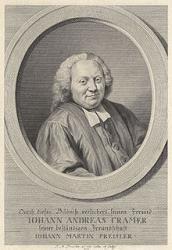
1723 - 1788 Person Name: J. A. Cramer, 1723-1788 Scripture: Isaiah 44:6 Author of "Der Herr ist Gott und keiner mehr" in Deutsches Gesangbuch für die Evangelisch-Luterische Kirche in den Vereinigten Staaten Cramer, Johann Andreas, born Jan. 27, 1723, at Jönstadt or Johann-Georgen-Stadt, in the Saxon Harz, where his father was pastor. After studying at the University of Leipzig, where he graduated M.A. in 1745, he was in 1748 appointed preacher at Crellwitz, near Lützen, and in 1750 Court Preacher and member of the Consistory at Quedlinburg. Four years later he became German Court Preacher to King Frederick V. of Denmark, at Copenhagen. There he obtained great fame as a preacher and teacher; and was appointed in 1765 Professor of Theology in the University. But after the accession of Charles VII., in 1766, the free-thinking party in the State gradually gained the ascendancy, and procured his removal; whereupon he was appointed, in 1771, Superintendent in Lubeck. When the orthodox party regained power in 1774, he was recalled to Denmark, as Vice-Chancellor, and First Professor of Theology in the University of Kiel, and in 1784 Chancellor. He died at Kiel on the night of June 11-12, 1788 (Koch, vi. 334-344; Allgemeine Deutsche Biographie, iv. 550-551; Bode, pp. 54-55—the last dating his birth, Jan. 29).
Cramer was rather a writer of religious lyrics than of hymns, though at least 80 of his compositions passed Into the hymn-books of his times. Those that have been translated into English are all included either in the Allgemeines Gesang-
Buch, Altona, 1780, which he edited for use in Schleswig-Holstein, or in his Sämmtliche Gedichtet Leipzig, 1782-3.
They are:—
i. Die ihr des Lebens edle Zeit. The duty of the Scholar. 1780, as above, No. 820, in 12 stanzas, repeated 1782, vol. ii. p. 319. Translated as, "O ye, who from your earliest youth," by Miss Winkworth, 1869, p. 321.
ii. Erheb, erheb, 0 meine Seele. Ps. civ. In his Poetische Uebersetzung der Psalmen, Leipzig, 1763, pt. iii., p. 65, in 16 stanzas. Included, 1780, as above, No. 124. The form translated is that in the Württemberg Gesang-Buch 1791, No. 36 (1842, No. 59), beginning with stanza ii. “Herr, dir ist niemand zu vergleichen." Tr. as, "Lord, none to Thee may be compared," by Miss Burlingham, in the British Herald, Jan. 1866, p. 200, repeated in Reid's Praise Book, 1872, No. 373.
iii. Erwachet, Harf’ und Psalter. Morning. Founded on Ps. cviii. First published in Zollikofer's Gesang-Buch, Leipzig, 1766, No. 71, in 6 stanzas. Repeated, 1780, as above, No. 2, and as No. 41 of the hymns appended to his Evangelische Nachahmungen der Psalmen Davids, Kopenhagen, 1769, p. 272. Translated by H. J. Buckoll, 1842, p. 59, as:—"Wake, harp and psaltery sounding."
iv. Schuf mich Gott für Augenblicke. Immortality of the Soul. 1780, as above, No. 136, in 12 St., repeated, 1782, vol. i. p. 181. Tr. (beginning with st. vi., "Geist! das ist mein hoher Name"), by Dr. H. Mills, 1845, as:—"Man were better nam'd a spirit."
v. Sterbend für das Heilder Sunder. Ascension. In the Bayreuth Gesang-Buch, 1779, No. 173, in 4 stanzas. Included, 1780, as above, No. 319, and 1782, vol. ii. p. 33. Translated by Dr. H. Mills, 1845, as:—"Dying a guilty world to save."
vi. Unerforschlich sei mir immer. God's Wisdom. First published in his Andachten in Betrachtungen, Gebeten und Liedern, &c, vol. ii., pt. ii., Schleswig and Leipzig, 1768, and thence in Rambach, v. 54. Included in 1769 (see No. iii.), p. 250, and 1780 as above, No. 78. Translated (1) in Sacred Poems by S. R. Maxwell, 1857, p. 126, as:— “Though inscrutable may ever"; (2) by Dr. G. Walker, 1860, p. 94, as:—" Inscrutable to me although."
[Rev. James Mearns, M.A.]
--John Julian, Dictionary of Hymnology (1907)
Johann Andreas Cramer


 My Starred Hymns
My Starred Hymns



